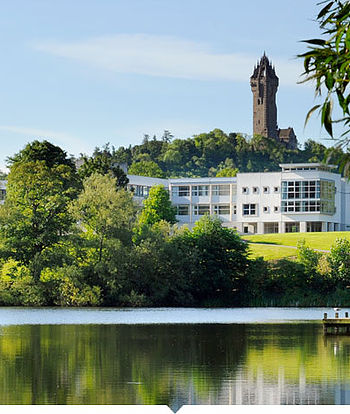 The University of Stirling was founded in 1967 and is one of the most modern and innovative universities in the UK. It was the first university to implement two 15-week long semester systems in the UK, which start in September and February respectively. There is a third shorter summer semester from late June to mid-August. The quality of teaching and scientific research at the University of Stirling has always been of the utmost importance.
The University of Stirling was founded in 1967 and is one of the most modern and innovative universities in the UK. It was the first university to implement two 15-week long semester systems in the UK, which start in September and February respectively. There is a third shorter summer semester from late June to mid-August. The quality of teaching and scientific research at the University of Stirling has always been of the utmost importance.
The University of Stirling is located in central Scotland, a charismatic and ancient city, Stirling attracts a large number of tourists from around the world every year. It has a good transport links, making it convenient to travel to and from.
Stirling has 7 schools including: the School of Applied Social Science, School of Arts and Humanities, School of Education, School of Natural Sciences, School of Nursing, Midwifery and Health, School of Sport and Stirling Management School. The courses cover Accounting, Economics, Business, Finance, Computing, Human Resources, Biology, Nursing, Midwifery and Philosophy. Its campus is one of best campuses in Europe, with the reputation of being one of the best universities in Scotland. Stirling provides many unique courses and it has strengths in many disciplines, such as Film and Media, Psychology, Aquatic Science, History and Political Science.
Stirling’s Subjects
Graduate Curriculum: British Studies: Publishing Industry Research, Gothic Ideas, Overseas Residents in the Post Colonial Period, Renaissance Studies; Film and Media Studies: Media Research, Media Management; Public Relations History; Historical Research, Environmental History; Modern Languages and Cultures; Modern French Literature and Society; Philosophy; Philosophy, Knowledge and Intellectual, Legal and Political Philosophy; Political Science; Religious Studies: Religion, Culture and Critical Theory; Applied Social Science; Applied Social Research, Criminology, Housing Research; Social Service Management; Management of Social Welfare Institutions; Social Service Research; Criminal Justice Research in Advanced Social Work and Social Care; Education: Education and Research; Continuing Education; Higher Education Administration; School Leadership and Management; English Teaching; Nursing and Midwifery; Social Care Psychology; Health Psychology; Psychological Research Methods; Accounting, Finance and Law: Investment Analysis; Finance; Computer Science and Mathematics: Information Technology; Economics: Economics, Banking and Financial; Management and Organization; Master of Business Administration; Public Service Management; Human Resources Management; Information Systems Management; Total Quality Management; Business Research; Technology and Innovation Management; Marketing; Retail Management; Sports; Aquaculture; Aquaculture; Veterinary Science (Aquatic Animals); Aquatic Pathology; Aquatic Sciences; Biological and Environmental Science for Sustainable Development; Environmental Management; Sustainable Development and Environmental History.
Undergraduate Curriculum: Accounting; Animal Biology; Aquaculture; Biology; Business Computing; Business Studies; Computer Science; Conservation Science; Criminology; Ecology; Economics; English Language Teaching; UK Research; Environmental Science; Environmental Science and Outdoor Education; European Film and Media; European Social Policy, Film and Media Studies; Finance; French; Freshwater Science; Geography; German; History; Human Resource Management; Information Systems; International Management and Cross-Cultural Studies; Journalism, Law and Commercial Law; Management; Marine Biology; Marketing; Mathematics and Application; Modern Languages; Currency, Banking and Finance; Nursing and Midwifery; Philosophy; Computer Science and Psychology; Political Science; Political Science and International Politics; Political Science; Philosophy and Economics; Psychology; Public Administration; Retail Marketing; Religious Studies; Scottish History; Scottish Literature; Social Work; Sociology and Social Policy; Software Engineering; Spanish; Sports Studies and Tourism Management.
Stirling’s Popular Courses
Excellent taught subjects include: Economics, English, History, Politics and International Studies, Psychology, Social Policy and Administration, Social Work, Sociology, Theology and Religions Studies.
Stirling’s Entry Requirements
Undergraduate Applications: IELTS 5.5 to 6.0 (up to 5 points each section); or TOEFL 550/213 (degree courses with literary content need 600/250) or equivalent. Cambridge Advanced: A grade. Cambridge Proficiency: C grade.
Postgraduate Applications: IELTS 6.0 to 7.0 (each section has 5.5-6); or TOEFL 550/213 (degree courses with literary content need 600/250).
Stirling can consider students who have the following education or equivalent qualifications:
- Equivalent to a four-year bachelor’s degree level 2:1.
- Students who have extensive professional work experience related to the appropriate curriculum.
- High school graduates that have completed Stirling’s one-year foundation course and passed the course, will be admitted to their undergraduate programmes.
- Three-year vocational diploma students can be admitted to university undergraduate degree programmes.
The University of Stirling’s Tuition and Living Costs
Postgraduate Tuition
Subjects taught in the classroom: £7,660 per year
Subjects taught in the laboratory: £9,500 per year
Foundation courses: £7,200 per year
Undergraduate Tuition
Subjects taught in the classroom: £7,660 per year
Subjects taught in the laboratory: £9,500 per year
Foundation courses: £7,200 per year
Living Expenses
Besides the tuition cost, the living expense for undergraduates is about £5,000 to £6,000 per year; for postgraduate it is approximately £6,500 per year. This depends entirely on the students’ lifestyle.
Accommodation: £200 – £250 per month.
Meals: £20-£35 per week.
